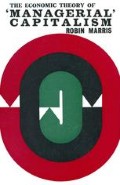Abstract
It was explained in the Introduction that the aims of this book lay mainly in the field of micro-theory. We wished to investigate the nature of the managerial enterprise, non-normatively, in a spirit of unrestricted intellectual curiosity; we did not want to be committed to producing a model which would necessarily be helpful in the conventional ways, such as informing bases for theories of price or income determination. But we naturally hoped that the results might also be of wider interest, and we have already indicated some possible implications of departing from partial-equilibrium analysis while retaining the basic theory. We also originally believed that the theory might have significant macro-implications, yet were not relying on this: we were genuinely uncertain as to what would be found when the stone had been lifted, and would have been by no means distressed had the discoveries tended merely to confirm existing orthodoxy in the area (if any such can be said to exist). However, now that the main work is complete, it does seem tempting to add, as it were by way of postscript, some speculations as to the possible macro-implications of a ‘managerial’ micro-theory. Of course, the economic macrocosm is much less managerial than the manufacturing sector: in agriculture, services and many branches of finance, traditional capitalism remains prevalent.
Access this chapter
Tax calculation will be finalised at checkout
Purchases are for personal use only
Preview
Unable to display preview. Download preview PDF.
Notes
Joan Robinson, The Accumulation of Capital, London, 1956.
R. F. Harrod, Towards a Dynamic Economics, London, 1948;
Evesey Domar, Essays in the Theory of Economic Growth, Oxford, 1957.
Joan Robinson, op. cit.; James Meade, A Neo-Classical Model of Growth, London, 1961;
Robert Solow, Quarterly Journal of Economics, 1956;
Trevor Swan, Economic Record, 1956.
L. Pasinetti, Review of Economic Studies 1964, No. 2.
See R. G. Lipsey, Economica, 1960, p. 1.
This statement is based on an analysis of the following: Kaldor, Essays on Value and Distribution, pp. 228–36, Essays on Economic Stability and Growth, pp. 256–300, and in The Theory of Capital, Macmillan, London, 1961, pp. 177–220; also Kaldor and Mirrlees, Review of Economic Studies, June 1962.
Author information
Authors and Affiliations
Copyright information
© 1964 Robin Marris
About this chapter
Cite this chapter
Marris, R. (1964). Possible Macro Implications. In: The Economic Theory of ‘Managerial’ Capitalism. Palgrave Macmillan, London. https://doi.org/10.1007/978-1-349-81732-0_8
Download citation
DOI: https://doi.org/10.1007/978-1-349-81732-0_8
Publisher Name: Palgrave Macmillan, London
Print ISBN: 978-1-349-81734-4
Online ISBN: 978-1-349-81732-0
eBook Packages: Palgrave History CollectionHistory (R0)

